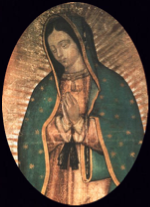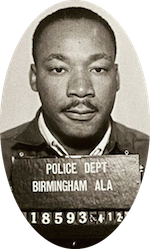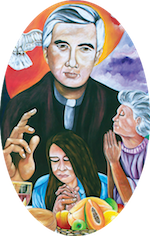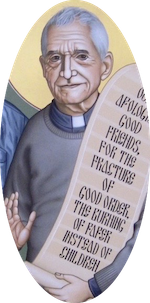[Edith Stein (1891-1942)]
nun, Discalced Carmelite, martyr
Commemorated 9 August
"We bow down before the testimony of the life and death of Edith Stein, an outstanding daughter of Israel and at the same time a daughter of the Carmelite Order, Sister Teresa Benedicta of the Cross, a personality who united within her rich life a dramatic synthesis of our century. It was the synthesis of a history full of deep wounds that are still hurting ... and also the synthesis of the full truth about man. All this came together in a single heart that remained restless and unfulfilled until it finally found rest in God." These were the words of Pope John Paul II when he beatified Edith Stein in Cologne on 1 May 1987.
Who was this woman?
Edith Stein was born in Breslau on 12 October 1891, the youngest of 11, as her family were celebrating Yom Kippur, that most important Jewish festival, the Feast of Atonement. "More than anything else, this helped make the youngest child very precious to her mother." Being born on this day was like a foreshadowing to Edith, a future Carmelite nun.
Edith's father, who ran a timber business, died when she had only just turned two. Her mother, a very devout, hard-working, strong-willed and truly wonderful woman, now had to fend for herself and to look after the family and their large business. However, she did not succeed in keeping up a living faith in her children. Edith lost her faith in God. "I consciously decided, of my own volition, to give up praying," she said.
In 1911 she passed her school-leaving exam with flying colours and enrolled at the University of Breslau to study German and history, though this was a mere "bread-and-butter" choice. Her real interest was in philosophy and in women's issues. She became a member of the Prussian Society for Women's Franchise. "When I was at school and during my first years at university," she wrote later, "I was a radical suffragette. Then I lost interest in the whole issue. Now I am looking for purely pragmatic solutions."
In 1913, Edith Stein transferred to Gottingen University, to study under the mentorship of Edmund Husserl. She became his pupil and teaching assistant, and he later tutored her for a doctorate. At the time, anyone who was interested in philosophy was fascinated by Husserl's new view of reality, whereby the world as we perceive it does not merely exist in a Kantian way, in our subjective perception. His pupils saw his philosophy as a return to objects: "back to things". Husserl's phenomenology unwittingly led many of his pupils to the Christian faith. In G6ttingen Edith Stein also met the philosopher Max Scheler, who directed her attention to Roman Catholicism. Nevertheless, she did not neglect her "bread-and-butter" studies and passed her degree with distinction in January 1915, though she did not follow it up with teacher training.
"I no longer have a life of my own," she wrote at the beginning of the First World War, having done a nursing course and gone to serve in an Austrian field hospital. This was a hard time for her, during which she looked after the sick in the typhus ward, worked in an operating theatre, and saw young people die. When the hospital was dissolved, in 1916, she followed Husserl as his assistant to the German city of Freiburg, where she passed her doctorate summa cum laude (with the utmost distinction) in 1917, after writing a thesis on "The Problem of Empathy."
During this period she went to Frankfurt Cathedral and saw a woman with a shopping basket going in to kneel for a brief prayer. "This was something totally new to me. In the synagogues and Protestant churches I had visited people simply went to the services. Here, however, I saw someone coming straight from the busy marketplace into this empty church, as if she was going to have an intimate conversation. It was something I never forgot. "Towards the end of her dissertation she wrote: "There have been people who believed that a sudden change had occurred within them and that this was a result of God's grace." How could she come to such a conclusion?
Edith Stein had been good friends with Husserl's Göttingen assistant, Adolf Reinach, and his wife.
When Reinach fell in Flanders in November 1917, Edith went to Göttingen to visit his widow. The Reinachs had converted to Protestantism. Edith felt uneasy about meeting the young widow at first, but was surprised when she actually met with a woman of faith. "This was my first encounter with the Cross and the divine power it imparts to those who bear it ... it was the moment when my unbelief collapsed and Christ began to shine his light on me - Christ in the mystery of the Cross."
Later, she wrote: "Things were in God's plan which I had not planned at all. I am coming to the living faith and conviction that - from God's point of view - there is no chance and that the whole of my life, down to every detail, has been mapped out in God's divine providence and makes complete and perfect sense in God's all-seeing eyes."
In Autumn 1918 Edith Stein gave up her job as Husserl's teaching assistant. She wanted to work independently. It was not until 1930 that she saw Husserl again after her conversion, and she shared with him about her faith, as she would have liked him to become a Christian, too. Then she wrote down the amazing words: "Every time I feel my powerlessness and inability to influence people directly, I become more keenly aware of the necessity of my own holocaust."
Edith Stein wanted to obtain a professorship, a goal that was impossible for a woman at the time. Husserl wrote the following reference: "Should academic careers be opened up to ladies, then I can recommend her whole-heartedly and as my first choice for admission to a professorship." Later, she was refused a professorship on account of her Jewishness.
Back in Breslau, Edith Stein began to write articles about the philosophical foundation of psychology. However, she also read the New Testament, Kierkegaard and Ignatius of Loyola's Spiritual Exercises. She felt that one could not just read a book like that, but had to put it into practice.
In the summer of 1921. she spent several weeks in Bergzabern (in the Palatinate) on the country estate of Hedwig Conrad-Martius, another pupil of Husserl's. Hedwig had converted to Protestantism with her husband. One evening Edith picked up an autobiography of St. Teresa of Avila and read this book all night. "When I had finished the book, I said to myself: This is the truth." Later, looking back on her life, she wrote: "My longing for truth was a single prayer."
On 1 January 1922 Edith Stein was baptized. It was the Feast of the Circumcision of Jesus, when Jesus entered into the covenant of Abraham. Edith Stein stood by the baptismal font, wearing Hedwig Conrad-Martius' white wedding cloak. Hedwig washer godmother. "I had given up practising my Jewish religion when I was a 14-year-old girl and did not begin to feel Jewish again until I had returned to God." From this moment on she was continually aware that she belonged to Christ not only spiritually, but also through her blood. At the Feast of the Purification of Mary - another day with an Old Testament reference - she was confirmed by the Bishop of Speyer in his private chapel.
After her conversion she went straight to Breslau: "Mother," she said, "I am a Catholic." The two women cried. Hedwig Conrad Martius wrote: "Behold, two Israelites indeed, in whom is no deceit!" (cf. John 1:47).
Immediately after her conversion she wanted to join a Carmelite convent. However, her spiritual mentors, Vicar-General Schwind of Speyer, and Erich Przywara SJ, stopped her from doing so. Until Easter 1931 she held a position teaching German and history at the Dominican Sisters' school and teacher training college of St. Magdalen's Convent in Speyer. At the same time she was encouraged by Arch-Abbot Raphael Walzer of Beuron Abbey to accept extensive speaking engagements, mainly on women's issues. "During the time immediately before and quite some time after my conversion I ... thought that leading a religious life meant giving up all earthly things and having one's mind fixed on divine things only. Gradually, however, I learnt that other things are expected of us in this world... I even believe that the deeper someone is drawn to God, the more he has to `get beyond himself' in this sense, that is, go into the world and carry divine life into it."
She worked enormously hard, translating the letters and diaries of Cardinal Newman from his pre-Catholic period as well as Thomas Aquinas' Quaestiones Disputatae de Veritate. The latter was a very free translation, for the sake of dialogue with modern philosophy. Erich Przywara also encouraged her to write her own philosophical works. She learnt that it was possible to "pursue scholarship as a service to God... It was not until I had understood this that I seriously began to approach academic work again." To gain strength for her life and work, she frequently went to the Benedictine Monastery of Beuron, to celebrate the great festivals of the Church year.
In 1931 Edith Stein left the convent school in Speyer and devoted herself to working for a professorship again, this time in Breslau and Freiburg, though her endeavours were in vain. It was then that she wrote Potency and Act, a study of the central concepts developed by Thomas Aquinas. Later, at the Carmelite Convent in Cologne, she rewrote this study to produce her main philosophical and theological oeuvre, Finite and Eternal Being. By then, however, it was no longer possible to print the book.
In 1932 she accepted a lectureship position at the Roman Catholic division of the German Institute for Educational Studies at the University of Munster, where she developed her anthropology. She successfully combined scholarship and faith in her work and her teaching, seeking to be a "tool of the Lord" in everything she taught. "If anyone comes to me, I want to lead them to Him."
In 1933 darkness broke out over Germany. "I had heard of severe measures against Jews before. But now it dawned on me that God had laid his hand heavily on His people, and that the destiny of these people would also be mine." The Aryan Law of the Nazis made it impossible for Edith Stein to continue teaching. "If I can't go on here, then there are no longer any opportunities for me in Germany," she wrote; "I had become a stranger in the world."
The Arch-Abbot of Beuron, Walzer, now no longer stopped her from entering a Carmelite convent. While in Speyer, she had already taken a vow of poverty, chastity and obedience. In 1933 she met with the prioress of the Carmelite Convent in Cologne. "Human activities cannot help us, but only the suffering of Christ. It is my desire to share in it."
Edith Stein went to Breslau for the last time, to say good-bye to her mother and her family. Her last day at home was her birthday, 12 October, which was also the last day of the Feast of Tabernacles. Edith went to the synagogue with her mother. It was a hard day for the two women. "Why did you get to know it [Christianity]?" her mother asked, "I don't want to say anything against him. He may have been a very good person. But why did he make himself God?" Edith's mother cried. The following day Edith was on the train to Cologne. "I did not feel any passionate joy. What I had just experienced was too terrible. But I felt a profound peace - in the safe haven of God's will." From now on she wrote to her mother every week, though she never received any replies. Instead, her sister Rosa sent her news from Breslau.
Edith joined the Carmelite Convent of Cologne on 14 October, and her investiture took place on 15 April, 1934. The mass was celebrated by the Arch-Abbot of Beuron. Edith Stein was now known as Sister Teresia Benedicta a Cruce - Teresa, Blessed of the Cross. In 1938 she wrote: "I understood the cross as the destiny of God's people, which was beginning to be apparent at the time (1933). I felt that those who understood the Cross of Christ should take it upon themselves on everybody's behalf. Of course, I know better now what it means to be wedded to the Lord in the sign of the cross. However, one can never comprehend it, because it is a mystery." On 21 April 1935 she took her temporary vows. On 14 September 1936, the renewal of her vows coincided with her mother's death in Breslau. "My mother held on to her faith to the last moment. But as her faith and her firm trust in her God ... were the last thing that was still alive in the throes of her death, I am confident that she will have met a very merciful judge and that she is now my most faithful helper, so that I can reach the goal as well."
When she made her eternal profession on 21 April 1938, she had the words of St. John of the Cross printed on her devotional picture: "Henceforth my only vocation is to love." Her final work was to be devoted to this author.
Edith Stein's entry into the Carmelite Order was not escapism. "Those who join the Carmelite Order are not lost to their near and dear ones, but have been won for them, because it is our vocation to intercede to God for everyone." In particular, she interceded to God for her people: "I keep thinking of Queen Esther who was taken away from her people precisely because God wanted her to plead with the king on behalf of her nation. I am a very poor and powerless little Esther, but the King who has chosen me is infinitely great and merciful. This is great comfort." (31 October 1938)
On 9 November 1938 the anti-Semitism of the Nazis became apparent to the whole world.
Synagogues were burnt, and the Jewish people were subjected to terror. The prioress of the Carmelite Convent in Cologne did her utmost to take Sister Teresa Benedicta of the Cross abroad. On New Year's Eve 1938 she was smuggled across the border into the Netherlands, to the Carmelite Convent in Echt in the Province of Limburg. This is where she wrote her will on 9 June 1939: "Even now I accept the death that God has prepared for me in complete submission and with joy as being his most holy will for me. I ask the Lord to accept my life and my death ... so that the Lord will be accepted by His people and that His Kingdom may come in glory, for the salvation of Germany and the peace of the world."
While in the Cologne convent, Edith Stein had been given permission to start her academic studies again. Among other things, she wrote about "The Life of a Jewish Family" (that is, her own family): "I simply want to report what I experienced as part of Jewish humanity," she said, pointing out that "we who grew up in Judaism have a duty to bear witness ... to the young generation who are brought up in racial hatred from early childhood."
In Echt, Edith Stein hurriedly completed her study of "The Church's Teacher of Mysticism and the Father of the Carmelites, John of the Cross, on the Occasion of the 400th Anniversary of His Birth, 1542-1942." In 1941 she wrote to a friend, who was also a member of her order: "One can only gain a scientia crucis (knowledge of the cross) if one has thoroughly experienced the cross. I have been convinced of this from the first moment onwards and have said with all my heart: 'Ave, Crux, Spes unica' (I welcome you, Cross, our only hope)." Her study on St. John of the Cross is entitled: "Kreuzeswissenschaft" (The Science of the Cross).
Edith Stein was arrested by the Gestapo on 2 August 1942, while she was in the chapel with the other sisters. She was to report within five minutes, together with her sister Rosa, who had also converted and was serving at the Echt Convent. Her last words to be heard in Echt were addressed to Rosa: "Come, we are going for our people."
Together with many other Jewish Christians, the two women were taken to a transit camp in Amersfoort and then to Westerbork. This was an act of retaliation against the letter of protest written by the Dutch Roman Catholic Bishops against the pogroms and deportations of Jews. Edith commented, "I never knew that people could be like this, neither did I know that my brothers and sisters would have to suffer like this. ... I pray for them every hour. Will God hear my prayers? He will certainly hear them in their distress." Prof. Jan Nota, who was greatly attached to her, wrote later: "She is a witness to God's presence in a world where God is absent."
On 7 August, early in the morning, 987 Jews were deported to Auschwitz. It was probably on 9 August that Sister Teresa Benedicta of the Cross, her sister and many other of her people were gassed.
When Edith Stein was beatified in Cologne on 1 May 1987, the Church honoured "a daughter of Israel", as Pope John Paul II put it, who, as a Catholic during Nazi persecution, remained faithful to the crucified Lord Jesus Christ and, as a Jew, to her people in loving faithfulness."
[Original: http://www.vatican.va/news_services/liturgy/saints/ns_lit_doc_19981011_edith_stein_en.html]




























